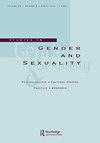缺乏内在好父亲的治疗性父亲
Q3 Social Sciences
引用次数: 0
摘要
在这篇短文中,我反思了一个悖论:尽管我在童年时期从未内化过这样的形象,但在心理治疗中,我却感到有必要为我的客户体现一个好的,特别是父亲般的形象。本文章由计算机程序翻译,如有差异,请以英文原文为准。
Therapeutic Fathering in the Absence of a Good Internal Father
ABSTRACT In this short piece, I reflect on the paradox of having felt compelled to embody a good—and specifically paternal—figure for my clients in psychotherapy, despite never having internalized such a figure in the course of my childhood.
求助全文
通过发布文献求助,成功后即可免费获取论文全文。
去求助
来源期刊

Studies in Gender and Sexuality
Social Sciences-Gender Studies
CiteScore
0.80
自引率
0.00%
发文量
15
期刊介绍:
Beginning in the final two decades of the 20th century, the study of gender and sexuality has been revived from a variety of directions: the traditions of feminist scholarship, postclassical and postmodern psychoanalytic theory, developmental research, and cultural studies have all contributed to renewed fascination with those powerfully formative aspects of subjectivity that fall within the rubric of "gender" and "sexuality." Clinicians, for their part, have returned to gender and sexuality with heightened sensitivity to the role of these constructs in the treatment situation, including the richly variegated ways in which assumptions about gender and sexuality enter into our understandings of "normality" and "pathology."
 求助内容:
求助内容: 应助结果提醒方式:
应助结果提醒方式:


